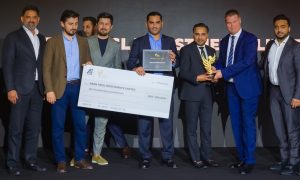NXN Group exec on the future of smart cities in the GCC
Big Project ME speaks to chief business officer Labib Matta about the firm’s work in high-tech urban environments

A smart city is defined as an urban development vision that integrates information and communication technology (ICT) and Internet of Things (IoT) technology in a secure manner, so as to manage a city’s assets. With the advances made in mobile and internet technology, the willingness to embrace the technology around smart cities has grown rapidly, with countries and cities looking to adopt and integrate them within their systems and processes across the board.
Improving the quality, performance and interactivity of urban services is a crucial component of smart cities, and nowhere is this more evident than in Dubai. As an early adopter of the concept in the GCC, the Dubai government has implemented several forward-thinking initiatives that have positioned it as a leader in the development and operation of smart cities.
Established with a mandate to collaborate with both the private sector and government partners, Smart Dubai is one such initiative that has borne fruit for HH Sheikh Mohammed bin Rashid Al Maktoum, the Ruler of Dubai, Vice President and Prime Minister of the UAE. Tasked with delivering and promoting an efficient, seamless, safe and impactful city experience for residents and visitors to Dubai, the quasi-government body has developed a tiered partnership framework from across the government, private sector and institutions of the UAE.
One such partner is the NXN Group, formerly known as neXgen, which has been working with the Dubai government on the Smart Dubai project for a number of years. In addition, this Dubai-based advisory and consulting services organisation has also been working with the likes of Aldar and Dubai Silicon Oasis to create expert strategy and deliver practical results in the development of smart cities.
Speaking exclusively to Big Project ME at NXN Group’s offices in Business Central Towers, Dubai Media City, chief business officer Labib Matta relates how the company got started, and how it has grown and evolved over the years to become one of the companies leading the regional push towards smart cities.
“NXN Group started back in 2008 as a consulting organisation, focusing mainly on consulting for smart city services as well as smart district services. At the time, the concept was still relatively new and was not very well accepted yet. People were just thinking of digital cities or digital services as the norm.
“However, we had some notable early successes – people were listening to what we had to say. We focused on working with governments, specifically the government in Dubai. We also started in Qatar with some of the private developers there, who were early adopters of the concept,” Matta says.
From there, the company’s growth was rapid, culminating in the launch of its Managed Services division last year. Matta explains that this arose from a desire to provide more than just consulting services.
“What we felt was that since we did a lot of the consulting work – and because we understood very well the smart cities services and the challenges that come with them – then it would be good for us to start moving into delivering those services and moving into the managed services model, which is what we started doing a year ago.
“Today, we’re balancing both businesses. We still do consult, but we also deliver for smart districts – by that we mean Energy Management, Facilities Management, Incident Management – which comes under Smart District Public Areas Management, Parking Management and so on. We’re also moving into Smart Security and some of the verticalised or niche service offerings.
“It was just the next step; it was the typical evolution of the business. Consultancy had led us to a certain place, but with our consulting work, a lot of our customers were saying, ‘OK, great. You’ve done the work, now come and help me execute it.’ We’ve started doing a lot of supervision work as well for the execution of the strategy or consulting work that was done. So the next step was to say, ‘Well, hold on. We can do this ourselves.’ That was basically the next step for us.”
This is all enabled by the platform developed by NXN, which has got the ability to collect data, analyse it and then take the appropriate action, such as generating a report or enacting a control action to improve things, he explains.
Developed as part of a strategic partnership with Zain Group, the platform is employed by NXN in the UAE, Kuwait and Saudi Arabia. In February 2016, Zain Group, a leading telecom innovator operating in eight markets across the Middle East and Africa, announced a strategic investment in NXN. This led to the establishment of a specialised business unit that delivers smart city solutions and managed services to governments and major real estate developers across Zain’s regional footprint, with both companies holding strong opinions about the power of mobile internet and how it can be a driving factor in improving lives and transforming the performance of cities in the region.
Keeping this in mind, Matta is keen to discuss the potential of smart cities in the GCC and how Dubai is setting the standard for the region to follow.
“Dubai is a little ahead of the curve, but we also see a lot of interest from other economies. The reason for that is the change in the financial model. It’s not only about smart cities or smart districts. There’s also the Commercial Engagement Model, this was completely rejected at an initial stage. As you know, most of the governments and private sector were more capital budgeting-based.
“They are now more open to listening to different business models – OPEX-based models, BOT models or BOO models – where we build it, own it and operate it. Now they’re more open to listening to this because of the financial crunch, and of course the OPEX model gives more value to the client.
“That allowed us to start gaining more momentum in the market. Initially, this was a challenge. The tendering structures that are available with the governments [of the GCC] limit your ability to push a managed service. It pushes you towards a CAPEX model. That’s one of the things that we’re starting to see shift, even at the government level, the acceptance of such models. Of course, the private sector is much more receptive,” he asserts.
Conversations about smart cities first began appearing in the early 2000s, Matta says, but only recently has there been a global change in attitudes towards their viability. It was only around 2008/2009, in the wake of the global financial recession, that international bodies started looking at the concept seriously.
“Smart cities emerged from a concept of digital cities, but the reality is – and there’s still a lot of confusion in the market that’s now being cleared up – that digital cities are not smart cities necessarily. Digital cities are connected cities, certainly, but they’re not necessarily going to give you the ability to make intelligent or predictive decisions. And that’s the difference between a smart and digital city.
“A smart city, on the other hand, is a connected city with the ability to read data from various sources, which include technical or non-technical sources. That is, it can be sensors, cameras or even people using their mobile or social media. It’s about taking all of this input, digesting it and then making sense of it, and then taking corrective or predictive actions, in order to improve the quality of life and living in that city,” he continues.
Stressing that services makes a smart city, Matta says the governance model must be the conductor of an orchestra – an entity must be responsible for making sure that all government and municipal departments are working together to achieve a common goal.
“That’s what really makes a smart city or a smart district. At the heart of it is still the smart services and the various sectors, such as environment, energy, water, waste, utilities, infrastructure and services related to people. Smart cities have two key dimensions – governance and people.”
People play a big role in smart cities, he adds, pointing out that NXN strives to make sure its strategies and plans include the local population.
“It’s about driving innovation through people. How do you ensure accountability for those smart initiatives? It’s not just that we’re doing this great thing and everybody is going to be happy. The reality is that there are certain things that people may want, that you’re not going to be able to deliver.
“We’re starting to see that governments across the GCC are starting to listen, or that they need to listen more to their citizens. That is a good way to gather input and data through various means, so as to be able to provide productive and meaningful services to their citizens. Improving government services to a certain area, improving city services in another area, infrastructure issues that come up… how do you deal with all of that if you don’t have a structured way of receiving feedback, analysing it, collating it with whatever you’re doing in terms of services or plans, and then improving your plans in order to achieve satisfaction for the people living in your city?”
A good example of this approach is the work NXN Group is doing in Saudi Arabia, where it is involved in the Smart Riyadh master plan. Here, the firm is tasked with turning the Kingdom’s capital into a smart city, putting in place a master plan and a roadmap for services across the city.
“There is the Ministry of Economy and Planning, the National Transformation Plan, Vision 2030… all of which are talking about turning Saudi Arabia into a smart nation. In Qatar, similar initiatives are also being put in place. So we’re seeing a major adoption and evolution of the concept across the region.
“Of course, it varies from country to country, and of course, infrastructure varies. And when I talk about infrastructure, I talk about legal policy as well as technical or physical infrastructure. It varies from country to country. Take Kuwait as an example – of course, it has an established infrastructure, but it may require more work or more involvement from a smart cities perspective, or from a smart cities policy perspective.
“Our region is a young region, it has new infrastructure and new developments, which makes it a lot easier to embed a lot of the technologies and requirements as part of the infrastructure that’s being built. However, on the government and city framework side, as well as the legislative policies, centralised orchestration and management may not be there.
“There’s a technical side and technology side, but there’s also a social and legal framework. While an emerging market may have an advantage on the technology side, from a cost and operational perspective it still has a way to go on the operational and legal framework.”
Finally, with the interview coming to a close, Labib Matta turns his attention to what NXN will do next. The company is already keen to move forward and evolve further. Of particular interest is data analytics, which is a key trend for the smart cities concept, driving change across a range of sectors and services.
“We’re excited because this is an emerging region. It’s moving at varying speeds, depending on the countries and markets, but that means that the opportunities are there for years to come. Dubai is ahead of the pack, but other countries are starting their journey, and of course we’re looking at it from a regional perspective. We have operations in the UAE, Saudi Arabia, Kuwait and we even have an office in Beirut, which looks at the Levant area.
“So you can see that from a regional expansion perspective, the road for us is the GCC, the Levant and Egypt. We see a lot of potential opportunities happening in the smart cities area.”
From a technology perspective, two major sectors being focused on are big data and cyber security, he adds.
“We feel that this is where we want to go forward: big data analytics and cyber security. That’s what we’re really focused on. We feel that these two sectors not only relate to the job we’re doing, but they allow us to differentiate ourselves, while also being applicable to a lot of industry sectors that we want to get involved in,” he concludes.

























